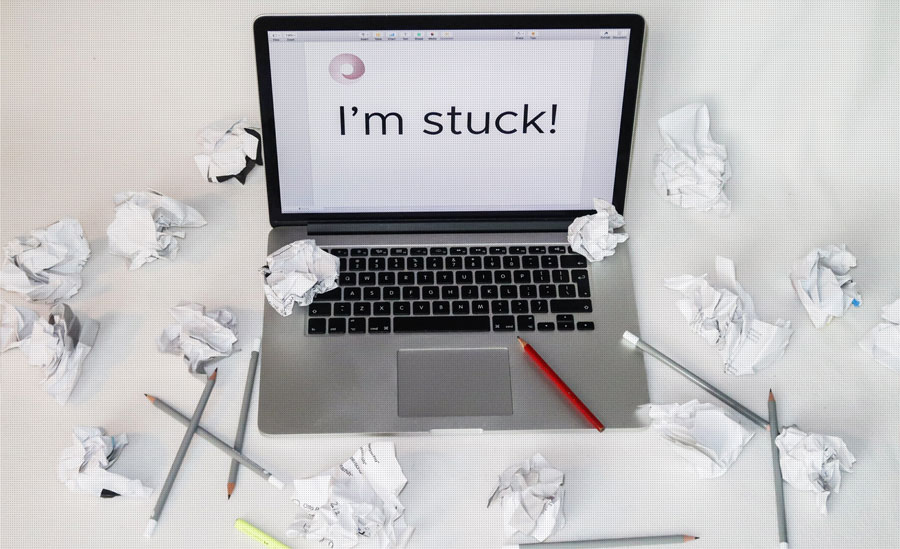Are you sitting in front of your laptop with the best intentions to write your paper, but it just isn’t happening? You just don’t get anything written? You’re getting frustrated and angry about your lack of productivity, and this increases the pressure even more: “I have to write this paper now!” Sometimes, we get stuck when we’re about to write a paper, or it happens in the middle of paper-writing. It doesn’t feel good, but there are ways to get out of this situation.
1. What does it look like when you’re stuck on your paper?
At the beginning of paper-writing, you often browse and read a lot of other literature. You want to know the state-of-the-art in your field well so as to embed your work into its context. The problem is that the state-of-the-art is constantly changing. Weekly, if not daily, new work gets published that is related to your research. When you want to consider all the new stuff, you easily get stuck because the information stream doesn’t stop.
The classical moment of getting stuck in paper-writing can hit you at the very beginning. You sit in front of the blank page or screen and somehow you know you need to fill this space now, but what would be the best way to fill it? You sit and wait for that great starting sentence, but the longer you wait the larger the white space in front of you seems to grow.
You’re probably working on a paper to report the results of a project that you’ve completed some time ago. The findings are not so new and hot anymore–at least for you–and therefore the drive to sit down and write it up has gone. Writing the paper just feels like a boring necessity.
Or, are you stuck in the middle of your paper and don’t know how to move on? You’ve written large parts of the methods and results, but now you have to create a paper out of these two fragmented sections—that is not always easy.
Another moment of ‘feeling stuck’ can happen when you’re waiting for input from your co-authors. They probably show no interest in the paper, and they typically act like reviewers and send you comments about what they don’t like and what they want YOU to change without contributing much else.
All of the situations that we sketched above point to a critical condition that many academic authors face: they’re getting stuck starting or completing their papers. It’s not a pleasant state to be in, and it drains your motivation and energy.
2. Why are you stuck with writing your paper?
The situations that we described above are part of the phenomenon of writer’s block. These are situations where writing seems impossible– when it feels painful and exhausting to write down just a few lines.
When you’re getting stuck on your paper, it most likely is due to one or a combination of the following three factors: timing, fear, and perfectionism.
Timing is a crucial element in writing. You ask yourself, is now really a good time to write? Do I have everything I need to get the writing done, or should I wait for a later moment and write then? For you as an author, it feels like the timing has to be right to do it, but you’re not sure that there is a good time for writing. Sometimes, timing is the reason for your writing blockade. You have a deadline to meet, or you know you’re already late starting and then the timing of your writing builds up additional pressure which prevents you from further progress. Deadlines and time pressure are not always as helpful when it comes to quality writing as we might think!
Fear is common when it comes to paper writing. You know that what you write will later be read, commented on, and eventually even criticised by peers. You’re not going to write the paper to keep it in your drawer. The paper that you produce will be essential to the outcome of your research, and available to everybody. You’re afraid it might not pass the quality standards and will end up getting rejected.
Perfectionism is factor number three that influences your writing performance. When you write, you probably try to get everything perfect straight from the start. In your first draft, you already want to display the excellence of your paper. You don’t allow yourself the opportunity to revise and improve, but strive for the perfect sentences from the start. You do this because in academia you’re surrounded by perfectionism, precision, and accuracy. You see, meet, and read the work of so many knowledgeable researchers who all seem to have written good papers. You probably don’t see that their work wasn’t so perfect from the start either.

3. How to break writer’s block and get ahead with your paper?
Let us give you some practical tips on how you can move on from ‘feeling stuck’ mode toward getting your paper back on track, and how to reduce the risk that you fall into such a mode again. In our free worksheet “Preventing writer’s block,” you can test yourself on what you would need to change to avoid or get out of writer’s block.
- Don’t panic! The feeling of getting stuck is not a sign of an emergency. ‘Feeling stuck’ happens to experienced writers as well. It is a sign that you need to reconsider the way you write papers. You’ll find some help with this in our blog posts #64, #63, #54 and #5.
- Brainstorm paper ideas. Don’t expect to have the perfect storyboard of your paper in your head before you start writing it. Allow yourself to develop that storyboard first. Brainstorm all the topics and aspects you want to include in the paper, create a mind map, a flow-chart, or a drawing of these ideas, and skip those that don’t fit into your large picture in a second step.
- Use handwriting. As an academic, you’re often sitting in front of computers. Sometimes it simply helps to do note-taking, brainstorming, and drafting of ideas for a paper with good, old-fashioned handwriting in a notebook. Many of our posts that we publish on the Smart Academics Blog get born this way.
- Create an outline. Don’t start writing anything about your work before you have an idea on what the paper will be about. If you create an outline first, the writing will flow much easier.
- Clarify your message. Getting stuck on a paper often has to do with not knowing exactly what the message of your paper should be. Think about this before drafting any sections.
- Keep expectations to a realistic level. You don’t need to hit thousands of words per day–it is great if you manage to write just a little bit per day, You’ll also make progress with one or two paragraphs per day only.
- Establish a writing routine. Instead of blocking out long blocks of time for writing, use short but regular writing sessions of 15, 30 or 45 minutes to build a writing routine.
- Stop writing, do something else. Yes, that’s what you wanted to hear, isn’t it? Well, if the pressure to write your paper is getting too high, it doesn’t help to just sit at your desk or wherever your writing spot is and do nothing. Do something else to relax … then come back to writing.
- Start writing earlier. We don’t mean you have to get up earlier in the morning to write. What we mean is don’t wait to start writing your paper until the deadline is too close. You will experience increased pressure, and that is not helpful. Rather, start writing your paper while you’re still busy doing some of the research.
- Tell a friend about your paper idea. Meet with a friend, a good colleague or somebody else you get along with l and tell them what your paper should be about. Explain to them the idea of the paper and what is special about it. This often helps to break you out of writer’s block, and you’ll find it easier to write it all up later.
- Aim for ideas not for perfectionism. Get the first draft of your paper with your ideas written. It doesn’t have to be the best version of the paper, it’s just a draft.
- Don’t worry about language, style and format. Focus on creating a draft version of your paper and forget about misspellings, grammar, style, and specific formatting that the journal might require. First, get the text written.
- Write for yourself. Start writing your draft as if you would never show it to anybody else. Allow yourself to make mistakes and anything else that could be done wrong, but get something written. You can clean it up later.
- Don’t chase every piece of literature. You can eat up your time and energy by browsing, ordering, and reading every other paper that might be related to your work. This is a bit of an endless effort. Instead, write down what you already know and what you want to say. Later, you can add selected relevant sources and evidence from the literature.
- Find your writing spot. It doesn’t have to be at your office desk–it could be anywhere. Just find a spot where you can create the environment you need for a good writing session (comfortable, with music or quiet, cosy light, no distractions, something to drink).
- Take a break, take a walk. For sure, we know, everybody says this about dealing with writing blockades. It sounds like a stereotypical answer. But it DOES help. If you’re stuck, do something else and get out for a short walk. You may still think about why you got stuck, but you’ll have found a way to move on once you’re back, promise!
- Reward yourself. It helps to think about a writing incentive or just a little reward that you grant yourself after you have completed a writing session. It is something to look forward to once the writing is done!

Conclusion
When you’re stuck on writing your paper, you’re in a stage that requires action. Nothing will change if you don’t do anything now. It does not help cope with writer’s block to stop writing and wait until you feel like you’re in a better mood, or until you think writer’s block has gone. This moment may never come.
Go to our free worksheet “Preventing writer’s block” and find out what you need to do to move ahead with your paper. We have listed a whole bunch of small actions that you can take—if you’re not doing them already—to prevent getting stuck again. The best way to overcome writer’s block is by writing!
Good luck with getting back on track with your paper, reach out if you need help, or sign-up for our online paper-writing programme Paper Writing Academy.
Relevant resources:
- Worksheet “Preventing Writer’s Block”
- Blog post #5: How to get started with writing papers?
- Blog post #54: 5 warning signs that indicate you should change the way you write papers
- Blog post #63: Train your writing muscle: Achieve better results
- Blog post #64: How to work on your paper without struggle
More information:
Do you want to successfully write and publish a journal paper? If so, please sign up to receive our free guides.
© 2020 Tress Academic
#WritingPapers, #PaperWriting, #AcademicWriting, #JournalPaper, #WritersBlock, #WritingBlockade, #WritingBarriers
